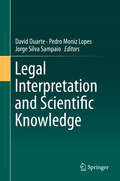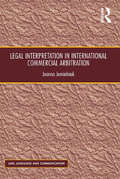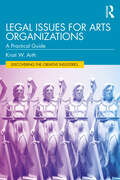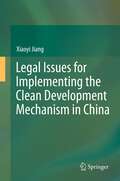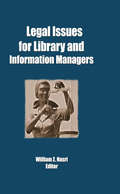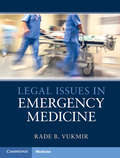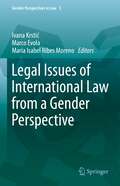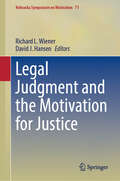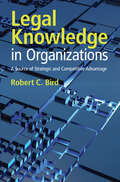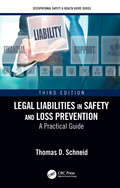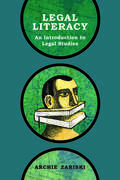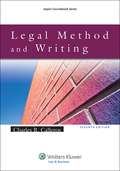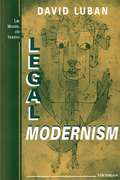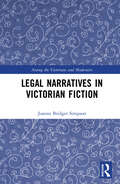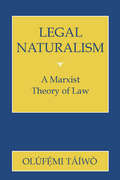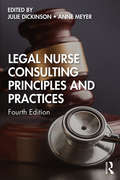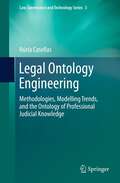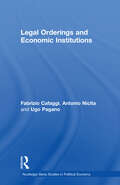- Table View
- List View
Legal Interpretation and Scientific Knowledge
by David Duarte Jorge Silva Sampaio Pedro Moniz LopesThis book discusses the question of whether legal interpretation is a scientific activity. The law’s dependency on language, at least for the usual communication purposes, not only makes legal interpretation the main task performed by those whose work involves the law, but also an unavoidable step in the process of resolving a legal case. This task of decoding the words and sentences used by normative authorities while enacting norms, carried out in compliance with the principles and rules of the natural language adopted, is prone to all of the difficulties stemming from the uncertainty intrinsic to all linguistic conventions. In this context, seeking to determine whether legal interpretation can be scientific or, in other words, can comply with the requirements for scientific knowledge, becomes a central question. In fact, the coherent application of the law depends on a knowledge regarding the meaning of normative sentences that can be classified (at least) as being structured, systematically organized and tendentially objective. Accordingly, this book focuses on analyzing precisely these problems; its respective contributions offer a range of revealing perspectives on both the problems and their ramifications.
Legal Interpretation in International Commercial Arbitration (Law, Language and Communication)
by Joanna JemielniakThis book fills a gap in legal academic study and practice in International Commercial Arbitration (ICA) by offering an in-depth analysis on legal discourse and interpretation. Written by a specialist in international business law, arbitration and legal theory, it examines the discursive framework of arbitral proceedings, through an exploration of the unique status of arbitration as a legal and semiotic phenomenon. Historical and contemporary aspects of legal discourse and interpretation are considered, as well as developments in the field of discourse analysis in ICA. A section is devoted to institutional and structural determinants of legal discourse in ICA in which ad hoc and institutional forms are examined. The book also deals with functional aspects of legal interpretation in arbitral discourse, focusing on interpretative standards, methods and considerations in decision-making in ICA. The comparative examinations of existing legal framework and case law reflect the international nature of the subject and the book will be of value to both academic and professional readers.
Legal Issues Relating to Time Charterparties
by D. Rhidian ThomasLegal Issues Relating to Time Charterparties addresses all the major questions and issues that arise in connection with time charterparties, examining them in a logical manner, progressively tracing the subject from the creation to the termination of the contract. All the salient legal aspects of time charterparties are examined, with the law analysed in its commercial context, particularly in relation to the various ways in which time charterparties may be used in shipping and international trade.
Legal Issues for Arts Organizations: A Practical Guide (Discovering the Creative Industries)
by Kristi W. ArthLegal issues touch every aspect of organizations in the creative and cultural sectors. This book teaches non-lawyer, arts administration professionals and students how to identify and manage legal issues common to arts organizations.Legal Issues for Arts Organizations demystifies common legal problems and helps readers to approach them proactively. With an easy-to-remember “issue-spotting” process, the book helps develop the average administrator’s “eye” for legal issues, so that the administrator knows when to do more research and when to seek out professional legal assistance. Written by a law professor and former intellectual property litigator with experience in arts policy and administration, this book provides a framework that arts professionals can use to navigate legal issues with increased confidence. It provides an overview of the American legal system, teaches a systematic process for identifying legal issues, trains administrators to read and understand contracts, gives practical advice for working with professional lawyers, and puts theory into practice with an applied learning component.Packed with practical tips and advice, this book provides a primer that every arts administrator and every arts- and nonprofit-management student will find immediately useful.A book adoption gift containing teaching support materials is available to instructors. To gain access, visit www.routledge.com/9780367771133.
Legal Issues for Implementing the Clean Development Mechanism in China
by Xiaoyi JiangToday, climate change is among the most hotly-debated topics. The Clean Development Mechanism (CDM), one of the three financial mechanisms under the Kyoto Protocol open to developing and developed countries, was devised to assist in mitigation of global warming. This book discusses what China should do to make full use of the CDM to promote sustainable development and to meet the challenge of climate change from a legal perspective. The findings lead to the conclusion that the CDM has limitations in promoting sustainable development in China, and thus should be regarded only as a complementary instrument in combating climate change. Legal strategies for improving the implementation of CDM projects under the legal framework in China are thus put forward, and some proposals for China to meet the challenge of climate change in the post-2012 era are made. This book offers new insights to academics and policymakers both in the public and private sector. It is intended for legal practitioners and researchers on carbon trading as well as policymakers interested in the role of developing countries in climate change law. In addition, it is of interest to stakeholders of CDM projects.
Legal Issues for Library and Information Managers
by William Z NasriHere is a useful and readable volume about important and controversial legal issues of concern to all library managers and information professionals. Learn the implications of the complex, relevant laws on collective bargaining, privacy of circulation files, employee record keeping, personnel management, censorship, copyright, and much more.
Legal Issues in Emergency Medicine
by Rade B. VukmirOn any given day in the emergency department, the chance of confronting a medical-legal dilemma is significant. Emergency medicine and critical care practitioners may have to deal with malpractice claims, informed consent, protection of minors, resuscitation, operational issues and legal compliance requirements frequently. Substantial knowledge of the law as it pertains to their emergency care and acute care practice is essential. Legal Issues in Emergency Medicine is an invaluable resource for medical practitioners, legal practitioners and administrators in practice and in training. The book covers key topics that have direct relevance to day to day acute patient care practice. Each topic includes a clinical vignette, followed by a review of the legal controversy, current medical scientific evidence, case law and preventative solutions to the dilemma. This approach allows practitioner exposure to a wide variety of medical-legal problems, allowing a preemptive, informed approach to problem solving.
Legal Issues in Information Security
by Joanna Lyn GramaThoroughly revised and updated to address the many changes in this evolving field, the third edition of Legal and Privacy Issues in Information Security addresses the complex relationship between the law and the practice of information security. <p><p>Information systems security and legal compliance are required to protect critical governmental and corporate infrastructure, intellectual property created by individuals and organizations alike, and information that individuals believe should be protected from unreasonable intrusion. Organizations must build numerous information security and privacy responses into their daily operations to protect the business itself, fully meet legal requirements, and to meet the expectations of employees and customers. Instructor Materials for Legal Issues in Information Security include: PowerPoint Lecture Slides Instructor's Guide Sample Course Syllabus Quiz & Exam Questions Case Scenarios/Handouts <p><p>New to the third Edition: • Includes discussions of amendments in several relevant federal and state laws and regulations since 2011 • Reviews relevant court decisions that have come to light since the publication of the first edition • Includes numerous information security data breaches highlighting new vulnerabilities
Legal Issues of International Law from a Gender Perspective (Gender Perspectives in Law #3)
by Ivana Krstić Marco Evola Maria Isabel Ribes MorenoThis book offers a new perspective on international law, which was, for centuries, male-dominant and gender-blind. However, this gender blindness has led to many injustices, the failure to recognize certain rights, and to impunity for serious crimes. The book examines the development of gender perspectives in various branches of international law, while also discussing and explaining certain universal standards. However, particular attention is paid to the European human rights system. Accordingly, the book provides detailed explanations of the EU’s external policies in relation to sex, sexual orientation, and gender identity. Also, there is a special focus on the relevant jurisprudence of the European Court of Human Rights in relation to gender and sexual orientation, female reproduction, and sexuality. The authors explain not only the importance of an adequate legal framework for combating gender inequality but also the detrimental effects of deeply rooted gender stereotypes and prejudices. Subsequently, the development of particular branches is presented, such as a gender-sensitive approach to the prevention of war crimes, gender perspectives in refugee law, and the evolution of gender-sensitive environmental law. In addition, the problematic situation of discrimination in the workplace is addressed from various perspectives. Many discussions, especially among EU member states, are reserved for the issue of women’s participation in managerial boards, while the growing awareness of gender equality in international trade agreements represents another interesting topic. Lastly, the book offers a historical perspective on the development of international law in the interwar period, with a particular focus on the situation in Yugoslavia. The book critically reconsiders the dominant molds of legal knowledge and presents innovative gender-sensitive and gender-competent insights on a variety of issues in international law, in order to introduce readers to new research topics relevant to gender equality and to stimulate the development of an international legal and institutional framework for achieving greater gender equality in practice. The collection of essays presented here will be of interest to all those working in the field of international law, as well as students and academics looking to broaden and deepen their research on a range of issues in international law from gender perspectives.
Legal Judgment and the Motivation for Justice (Nebraska Symposium on Motivation #71)
by David J. Hansen Richard L. WienerThis volume takes as its point of departure that those who work in the area of law and psychology currently possess a great deal of knowledge about the psychology of the legal system, including the way in which the behavior of legislators, judges, jurors, attorneys, litigants, and defendants shapes the outcome of justice. It has also become very clear that the main obstacles to beneficial modifications to the legal system stem from the lack of motivation to seek justice, motivation to change legal process, and motivation to make use of evidence-based decision making. The purpose of this volume is to examine the antecedents of the motivation for justice, describe how that motivation activates and manifests in various legal institutions (i.e., elections, legislatures, courts, and executive offices), and trace the failure of that motivation to influence legal decision making. This will include research and commentary about a) where the motivation for justice comes from when people make legal judgments and decisions, b) how the motivation for justice influences legal judgments and decisions, and c) how legal judgments and decisions influence the motivation for justice in positive and negative ways. This topic is paramount at the current time in our history in view of the apparent breakdown of society&’s beliefs in our institutions and trust in the democratic process, which has contributed to a system that has increasingly operated from tribalistic impulse rather than from a richer motivation for authentic justice.
Legal Knowledge in Organizations: A Source of Strategic and Competitive Advantage
by Robert C. BirdThis work offers a step-by-step guide on how to utilize the law as a source of value in organizations. Robert C. Bird demonstrates how legal knowledge can be a valuable asset for firms, providing them with a sustainable competitive advantage that is difficult for rivals to imitate. Bird presents a five-part framework that outlines how firms can use legal knowledge in competitive markets and how they can avoid misusing it. Chapters also highlight how firms can cultivate legal knowledge and apply novel risk tools to overcome unexpected legal threats. The book emphasizes the importance of ethical values in business decisions and shows how managers and lawyers can build an ethical practice of legal knowledge that benefits both business and society. With the help of numerous visuals, this book makes it easy for readers to leverage legal knowledge and apply it to specific business contexts.
Legal Lexicography: A Comparative Perspective (Law, Language and Communication)
by Máirtín Mac AodhaLegal lexicography or jurilexicography is the most neglected aspect of the discipline of jurilinguistics, despite its great relevance for translators, academics and comparative lawyers. This volume seeks to bridge this gap in legal literature by bringing together contributions from ten jurisdictions from leading experts in the field. The work addresses aspects of legal lexicography, both monolingual and bilingual, in its various manifestations in both civilian and common law systems. It thus compares epistemic approaches in a subject that is inextricably bound up with specific legal systems and specific languages. Topics covered include the history of French legal lexicography, ordinary language as defined by the courts, the use of law dictionaries by the judiciary, legal lexicography and translation, and a proposed multilingual dictionary for the EU citizen. While the majority of contributions are in English, the volume includes three written in French. The collection will be a valuable resource for both scholars and practitioners engaging with language in the mechanism of the law.
Legal Liabilities in Safety and Loss Prevention: A Practical Guide, Third Edition (Occupational Safety & Health Guide Series)
by Thomas D. SchneidThe goal of every safety professional and safety program is to be proactive and to identify problems while complying within safety guidelines. This book clarifies basic questions about legal liability, how to minimize, prevent, and identify legal risks. Appendices, case studies, and sample forms are included in this resource. The whole book will be revised due to the laws and regulations in the workplace changing. This revised edition will address all of the changes in the laws as well as providing guidance on how to achieve and maintain compliance. Features Covers methods to achieve and maintain compliance Includes new standards and regulations Discusses defense, rights, and responsibilities Provides a guide to professionals who are unfamiliar with reviewing, analyzing, and briefing a court decision Offers a new chapter on environmental and labor
Legal Literacy: An Introduction to Legal Studies
by Archie ZariskiTo understand how the legal system works, students must consider the law in terms of its structures, processes, language, and modes of thought and argument—in short, they must become literate in the field. Legal Literacy fulfills this aim by providing a foundational understanding of key concepts such as legal personhood, jurisdiction, and precedent, and by introducing students to legal research and writing skills. Examples of cases, statutes, and other legal materials support these concepts. While Legal Literacy is an introductory text, it also challenges students to consider critically the system they are studying. Touching on significant socio-legal issues such as access to justice, legal jargon, and plain language, Zariski critiques common legal traditions and practices, and analyzes what it means “to think like a lawyer.” As such, the text provides a sound basis for those who wish to pursue further studies in law or legal studies as well as those seeking a better understanding of how the legal field relates to the society that it serves.
Legal Lynching: Racism, Injustice, and the Death Penalty
by Jesse JacksonA legal and ethical analysis of the death penalty.
Legal Method And Writing
by Charles CallerosHighly regarded and classroom-proven, the Legal Method and Writing takes a comprehensive approach to legal writing that bridges law school and law office. Exercises and real-life examples--many taken from actual cases--provide stepping-off points from which to practice legal thinking and communication. Calleros seamlessly weaves multicultural themes into many of the problems and examples to add context and enrich student understanding of legal issues.
Legal Mobilization Under Authoritarianism
by Waikeung TamLegal mobilization is the process by which individuals invoke their legal rights and use litigation to defend or develop these rights against the government. In recent years, increasing attention has been paid to this phenomenon as it occurs under authoritarian regimes. It is often suggested that, in such situations, legal mobilization is caused by the strategic interests of the ruling elites. Using the case study of post-colonial Hong Kong, where legal mobilization has by no means unfolded as political authorities would wish, Waikeung Tam casts doubt on this contention. To do so, he examines in depth why and how legal mobilization arises under authoritarianism. Tam analyses quantitative data of changes in the Hong Kong judiciary agendas over the last three decades and uses detailed interviews with activists, politicians, cause lawyers, judges and government officials to reveal the complex underlying socio-political forces at play.
Legal Modernism
by David LubanModernism in legal theory is no different from modernism in the arts: both respond to a cultural crisis, a sense that institutions and traditions have lost their validity. Some doubt the importance of the rule of law, others question the objectivity of legal reasoning. We have lost confidence in the justice of our legal institutions, and even in our very capacity to identify justice. Legal philosopher David Luban argues that we cannot escape the modernist predicament. Accusing contemporary legal theorists of evading rather than confronting the challenge of modernity, he offers important and original objections to pragmatism, traditionalism, and nihilism. He argues that only by weaving together the broken narrative and forgotten voices of history's victims can we come to appreciate the nature of justice in modern society. Calling a trial the embodiment of the law's self-criticism, Luban demonstrates the centrality of narrative by analyzing the trial of Martin Luther King, the Nuremberg trials, and trial scenes in Homer, Hesiod, and Aeschylus. With these examples, Luban explores several of the tensions that motivate much more contemporary legal theory: order versus justice, obedience versus resistance, statism versus communitarianism.
Legal Narratives in Victorian Fiction (Among the Victorians and Modernists)
by Joanne Bridget SimpsonThe law holds up a mirror to society and reflects that society and its ongoing preoccupations. This book establishes legal interpretation as a mode of literary interpretation, contextualising the opinions and sociological background of literature within the context of the law of its period and examines the inherent role of the law in the construction of the narrative in the literature of the nineteenth century. From the approach to the operation of jurisprudence and legal application, to the prosecution of the poor, the criminological approach to moral panics and the use of the affirmative defence to mitigate women within society, this book explores the ways in which the authors of the period used the novel form as a way of challenging and critiquing the legal operating model of the world in which their characters found themselves; examining the way in which the authors of the period used the novel as a means of critiquing the nature of the role of the law within society, its impact upon the general public, and the reciprocity which exists between legal ideals and the society which manifests those ideals through thought and action. This is a useful text for students of nineteenth-century literature or the law.
Legal Naturalism: A Marxist Theory of Law
by Olufemi TaiwoLegal Naturalism advances a clear and convincing case that Marx's theory of law is a form of natural law jurisprudence. It explicates both Marx's writings and the idea of natural law, and makes a forceful contribution to current debates on the foundations of law. Olufemi Taiwo argues that embedded in the corpus of Marxist writing is a plausible, adequate, and coherent legal theory. He describes Marx's general concept of law, which he calls "legal naturalism." For Marxism, natural law isn't a permanent verity; it refers to the basic law of a given epoch or social formation which is an essential aspect of its mode of production. Capitalist law is thus natural law in a capitalist society and is politically and morally progressive relative to the laws of preceding social formations. Taiwo emphasizes that these formations are dialectical or dynamic, not merely static, so that the law which is naturally appropriate to a capitalist economy will embody tensions and contradictions that replicate the underlying conflicts of that economy. In addition, he discusses the enactment and reform of "positive law"--law established by government institutions--in a Marxian framework.
Legal Normativity in the Resolution of Internal Armed Conflict
by Philipp KastnerWith an estimated ninety-five percent of the world's armed conflicts occurring within individual states, resolution and prevention of internal conflicts represent a main driver of global peace. Peace negotiations stand outside the traditional formalism of lawmaking and represent a uniquely privileged moment to observe the rise or adjustment of the legal framework of a given state. Based in a socio-legal and pluralistic understanding of law, this book explores the normative dynamics of peace negotiations. It argues that the role of law in the peaceful resolution of internal armed conflicts has been greatly underestimated and that legal theory can and should contribute to a better comprehension of these processes. Including thematic case studies from Darfur, North-South Sudan, Uganda, Côte d'Ivoire, Colombia, Sri Lanka, Sierra Leone, Mozambique, Bosnia and Israel-Palestine, this volume will be of use to scholars, students and affiliates of international organizations and non-governmental organizations.
Legal Nurse Consulting Principles and Practices
by Anne Meyer Julie DickinsonLegal Nurse Consulting Principles and Practices, Fourth Edition, provides foundational knowledge on the specialty nursing practice of legal nurse consulting. Legal nurse consulting is defined, and essential information about the practice is discussed (history, certification, scope and standards of practice, and ethical and liability considerations). The essentials of the law and medical records are explored. Analysis of the various types of legal cases on which legal nurse consultants work is provided, as are other practice areas for legal nurse consultants. The various roles and skills of legal nurse consultants are explored, and the textbook concludes with discussion of the ways in which legal cases are adjudicated. This volume allows nurses to bridge the gap from their clinical experience to the unfamiliar territory of the legal world, with practical advice on topics including tactics for being cross-examined in the courtroom and investigative and analytical techniques for medical records. Individual chapters by subject-matter experts focus on the full range of legal, medical, and business issues that new or experienced legal nurse consultants and nurse experts will encounter in their work. A nuanced look at the realities and complexities of toxic torts, medical malpractice cases, civil rights in correctional healthcare, ERISA and HMO litigation, and other practice areas is offered. Suitable for experienced nurses studying for certification as legal nurse consultants, and for expert witnesses, practitioners seeking to expand their current legal nurse roles, and other healthcare and legal practitioners.
Legal Office: Concepts and Procedures
by Robert CumminsThis textbook-workbook is divided into three parts with seventeen chapters to provide the legal office assistant student with a logical frame of reference in the study of the basic concepts of the law.
Legal Ontology Engineering
by Núria CasellasEnabling information interoperability, fostering legal knowledge usability and reuse, enhancing legal information search, in short, formalizing the complexity of legal knowledge to enhance legal knowledge management are challenging tasks, for which different solutions and lines of research have been proposed. During the last decade, research and applications based on the use of legal ontologies as a technique to represent legal knowledge has raised a very interesting debate about their capacity and limitations to represent conceptual structures in the legal domain. Making conceptual legal knowledge explicit would support the development of a web of legal knowledge, improve communication, create trust and enable and support open data, e-government and e-democracy activities. Moreover, this explicit knowledge is also relevant to the formalization of software agents and the shaping of virtual institutions and multi-agent systems or environments. This book explores the use of ontologism in legal knowledge representation for semantically-enhanced legal knowledge systems or web-based applications. In it, current methodologies, tools and languages used for ontology development are revised, and the book includes an exhaustive revision of existing ontologies in the legal domain. The development of the Ontology of Professional Judicial Knowledge (OPJK) is presented as a case study.
Legal Orderings and Economic Institutions
by Ugo Pagano Antonio Nicita Fabrizio CafaggiThis book addresses the lively interaction between the disciplines of law and economics. The traditional boundaries of these two disciplines have somehow inhibited a full understanding of the functioning of and the evolution of economic and legal systems. It has often been the case that these boundaries have had to be reshaped, and sometimes abolis
